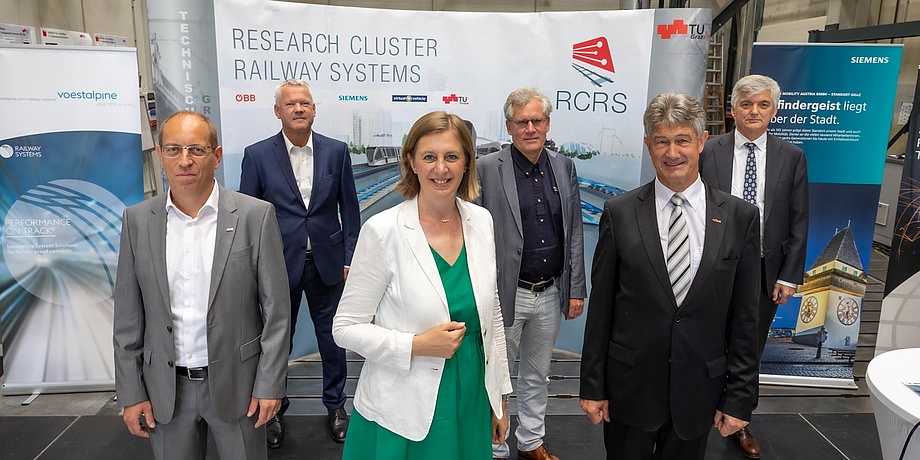Thessaloniki gets ready for its metro launch in November
The underground rapid transit lines have been under construction for almost two decades due to various project delays
 TheMayor.EU logo
TheMayor.EU logo The public and private sector will join forces to push for a more competitive rail system
The Research Cluster Railway Systems (RCRS) research initiative was founded in Graz on Wednesday. The Technical University (TU) in Graz, voestalpine, ÖBB, Siemens Mobility and Virtual Vehicle join forces in establishing a collaborative hub aiming to increase the competitiveness of railways. This would make the region of Styria an international research and innovation centre for the industry.
The plan for the cluster is that it should benefit specific areas of rail technology, such as rail infrastructure and rail operations with a focus on synergy potential and digital transformation.
RCRS will be established in TU Graz to maximise its potential as an influence on the sector, getting involved in the training and forming of the new generation of engineers and experts.
 Jointly presented the Research Cluster Railway Systems research initiative (from left to right): Mark Topal-Gökceli (ÖBB), Franz Kainersdorfer (voestalpine), State Councilor Barbara Eibinger-Miedl, Jost Bernasch (Virtual Vehicle), Harald Kainz (Graz University of Technology), Arnulf Wolfram (Siemens Mobility Austria). © Lunghammer - Graz University of Technology
Jointly presented the Research Cluster Railway Systems research initiative (from left to right): Mark Topal-Gökceli (ÖBB), Franz Kainersdorfer (voestalpine), State Councilor Barbara Eibinger-Miedl, Jost Bernasch (Virtual Vehicle), Harald Kainz (Graz University of Technology), Arnulf Wolfram (Siemens Mobility Austria). © Lunghammer - Graz University of Technology
This will go hand in hand with the planned simulation facilities and the two new professorships opened in the university – one for fatigue strength and rail vehicle technology and the other for rail infrastructure design.
The cluster's debut project is the Austrian Research Promotion Agency (FFG)-funded COMET project “Rail4Future”, which started in the spring under the leadership of ÖBB. The project is working on a new virtual platform with which new scenarios and developments in the rail sector can be simulated under operational and environmental impacts.
Mark Topal-Gökceli, CTO of ÖBB, shared some statistics in the press release on the university’s website: “In terms of climate protection, there is no way around the railway. In the transport sector alone, Austria must save an additional 8 million tonnes of CO 2 by 2030. And ÖBB is clearly part of the solution here. Therefore, every step that we take today for the mobility of tomorrow is extremely important.”
According to Harald Kainz, Rector of TU Graz railways are a particularly sustainable, intelligent, safe and comfortable means of transportation. Through investment and development, it can become a major contributor to the goals of the European Green Deal - climate neutrality by 2050.
Recently, TheMayor.EU interviewed Constanze Bannholzer, one of the key figures behind the rail digitalisation push in Austria. You can check out that interview over here to gain more insight.
If you want to keep up with how European cities and regions are changing, follow us on Facebook, Twitter and Instagram.

The underground rapid transit lines have been under construction for almost two decades due to various project delays

Now you can get your wine in Talence by paying directly in Bitcoin

That’s because the state has to spend money on updating the railway infrastructure rather than subsidizing the cost of the popular pass

Rethinking renewable energy sources for the urban landscape

The examples, compiled by Beyond Fossil Fuels, can inform and inspire communities and entrepreneurs that still feel trepidation at the prospect of energy transition

Now you can get your wine in Talence by paying directly in Bitcoin

The 10th European Conference on Sustainable Cities and Towns (ESCT) sets the stage for stronger cooperation between the EU, national and local level to fast track Europe's transition to climate neutrality.

At least, that’s the promise made by the mayor of Paris, Anne Hidalgo

The underground rapid transit lines have been under construction for almost two decades due to various project delays

At least, that’s the promise made by the mayor of Paris, Anne Hidalgo

Hostal de Pinós is located in the geographical centre of the autonomous region

Despite its church-y name, the district has long been known as the hangout spot for the artsy crowds

Urban dwellers across the EU are having a say in making their surroundings friendlier to people and the environment.

Forests in the EU can help green the European construction industry and bolster a continent-wide push for architectural improvements.

Apply by 10 November and do your part for the transformation of European public spaces

An interview with the Mayor of a Polish city that seeks to reinvent itself

An interview with the newly elected ICLEI President and Mayor of Malmö

A conversation with the Mayor of Lisbon about the spirit and dimensions of innovation present in the Portuguese capital














